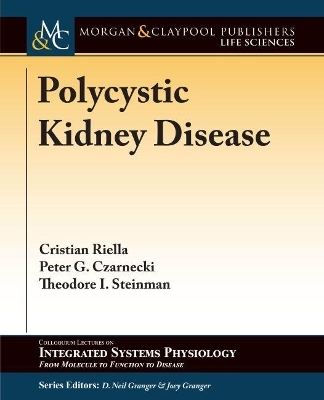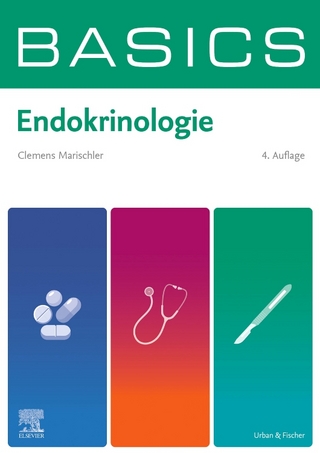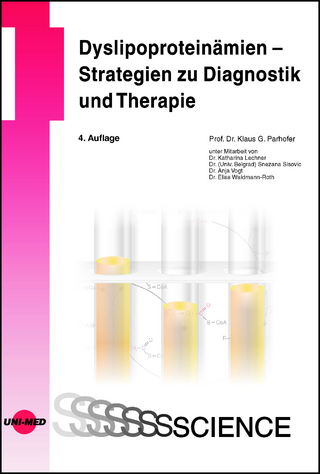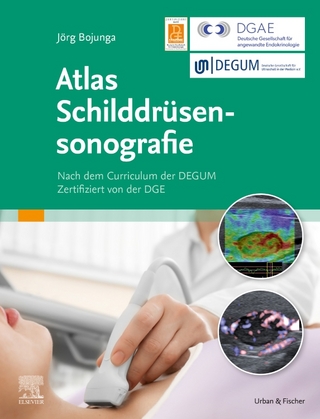
Polycystic Kidney Disease
Morgan & Claypool Publishers (Verlag)
978-1-61504-746-8 (ISBN)
This book reviews important aspects of polycystic kidney diseases, the latest scientific understanding of the diseases and syndromes, along with the therapies being developed. Cystic kidney diseases comprise a spectrum of genetic syndromes defined by renal cyst formation and expansion with variable extrarenal manifestations. The most prevalent disorder is the autosomal dominant polycystic kidney disease (ADPKD). It is the most common monogenetic disorder in humans and accounts for 4.4% of end-stage renal disease (ESRD) cases in the U.S. Patients inevitably progress to ESRD and require renal replacement therapy in the form of dialysis or transplantation. Through advancements in genomics and proteomics approaches, novel genes responsible for cystic diseases have been identified, further expanding our understanding of basic mechanisms of disease pathogenesis. The hallmark among all cystic genetic syndromes is the formation and growth of fluid-filled cysts, which originate from tubular epithelia of nephron segments. Cysts are the disease, and treatment strategies are being developed to target prevention or delay of cyst formation and expansion at an early stage, however no such therapy is currently approved.
Cristian V. Riella received his M.D. from Universidade Federal do Parana, Brazil in 2010. He then moved to Boston, for his post-graduate studies, where he completed training in internal medicine at Tufts University (2010-2013), followed by a clinical nephrology fellowship, at Beth Israel Medical Center (BIDMC), Harvard Medical School (2013-2015). He currently holds a position as Research Fellow at BIDMC. During his clinical training in nephrology, Dr. Riella had extensive exposure to polycystic kidney disease patients under the mentorship of Dr. Theodore Steinman, with whom he has published review articles and chapters on the subject. His main field of research is on inherited kidney diseases, focused on Apolipoprotein L1 (APOL1) genetic variants and its association with focal segmental glomerulosclerosis. Other interests include RNA sequencing, microRNA biology, computational biology and machine learning applications for biology research. Dr. Riella contributes actively to medical education as a tutor for the courses of Practice of Medicine and Renal Pathophysiology, Harvard Medical School. Peter Czarnecki earned his M.D. degree from the University of Freiburg in Germany, where he worked on biochemical interactions between nephronophthisis proteins in the laboratory of Gerd Walz. He moved to the Mayo Clinic, Rochester, MN, for his residency training in internal medicine and his fellowship in critical care medicine. At the Mayo Clinic, he continued his basic research on ciliopathies in the laboratory of Peter Harris. He came to the Beth Israel Deaconess Medical Center in Boston, MA, for his training in nephrology. He conducted clinical research in polycystic kidney disease under the mentorship of Ted Steinman, and he was a co-investigator on the HALT-PKD trials. At the same time, he pursued further basic research in ciliary biology with Jagesh Shah at Brigham and Women's Hospital, characterizing developmental signaling mechanisms in the ciliary Inversin Compartment. He took his first faculty position as Associate Physician in the Division of Renal Medicine at Brigham and Women's Hospital in 2014 and was appointed Instructor in Medicine at Harvard Medical School. He is member of the Harvard PKD center, continues his basic research in ciliary biology, and started a new subspecialty clinic for cystic and genetic kidney diseases at BWH. Dr. Theodore I. Steinman, a Philadelphia native and a 1956 graduate from Olney High School, received his undergraduate degree in 1960 from Penn State University (B.S. in Pre-Medicine) and his M.D. from Georgetown University School of Medicine in 1964. Internship and junior residency in Internal Medicine were at Cedars-Sinai Medical Center, Los Angeles, CA. Senior Internal Medicine residency was completed at Beth Israel Hospital, Boston in 1969, following a 2-year tour of duty in the U.S. Navy (1966-1968), serving one year in Vietnam as the battalion surgeon with a Marine infantry battalion. Advanced Nephrology Fellowship training was at Tufts New England Medical Center, Boston (1969-1971) under the leadership of Drs. William B. Schwartz and Jerome B. Kassirer. From there Dr. Steinman returned to Beth Israel Hospital in 1971 to found the dialysis and kidney transplantation programs, and was the Director of the programs for the next 31 years. D. Neil Granger, Ph.D., is Boyd Professor and Head of the Department of Molecular and Cellular Physiology at the LSU Health Sciences Center in Shreveport, Louisiana. His current research is focused on the role of the microcirculation in acute and chronic inflammation, and how risk factors for cardiovascular disease influence microvascular function. Granger has served on the editorial boards of the Heart & Circulation, GI & Liver, and Cell sections of the American Journal of Physiology, as well as Circulation Research, Microcirculation, Shock, Pathophysiology, Free Radical Biology & Medicine, Lymphatic Research and Biology, and Nitric Oxide Biology & Chemistry. He was Editor-in-Chief of Microcirculation and an Associate Editor of the American Journal of Physiology: GI & Liver Physiology. Dr. Granger was a member of the Clinical Sciences-2, Cardiovascular & Renal, and General Medicine-A2 Study Sections and the Gastrointestinal Mucosal Pathobiology Study Sections. He also served on several peer review panels and policy committees for the American HeartAssociation, the Research Committee of the American Gastroenterological Association, the Board of Directors of the Federation of American Societies for Experimental Biology, and the Physiology Test Committee of the National Board of Medical Examiners. Granger served as President of the American Physiological Society (APS) and the Microcirculatory Society (MCS). He has received several awards and honors for his research, including the APS Bowditch Award, the Distinguished Research Award from the GI Section of the APS, the Landis Award from the US Microcirculatory Society, the Laerdal Award from the Society for Critical Care Medicine, the McKenna Memorial Award from the Canadian Association of Gastroenterology, the Dolph Adams Award from the Society for Leukocyte Biology, the Career of Distinction Award from the Oxygen Society, the Nishimaru-Tsuchiya International Award from the Japanese Microcirculatory Society, the Robert M Berne Lectureship from the APS, and the Benjamin W. Zweifach Award from the US Microcirculatory Society. He was also designated a Highly Cited Investigator by the Institute for Scientific Information. Joey P. Granger, Ph.D., is the Billy S. Guyton Distinguished Professor, Professor of Physiology and Medicine, Director of the Center for Excellence in Cardiovascular Renal Research, and Dean of the School of Graduate Studies in the Health Sciences at the University of Mississippi Medical Center in Jackson, MS. He earned his doctorate from the University of Mississippi School of Medicine in 1983. Dr. Granger currently serves as President-elect of American Physiological Society (beginning in April for the 2010 through April 2012 term) and is an Associate Editor for Hypertension. He has also served as the Editor of the Council for High Blood Pressure Newsletter and an Associate Editor for News in Physiological Sciences and American Journal of Physiology. He has served as a member of Editorial Boards of American Journal of Hypertension, American Journal of Physiology-Renal, American Journal of Physiology: Regulatory and Integrative Physiology, Journal of CardioMetabolic Syndrome and the Journal of the American Society of Hypertension. He has served on scientific study sections for the American Heart Association (AHA), National Institutes of Health, NASA, and the Veterans Administration. He now serves as chair of the Hypertension and Microcirculation NIH study section. He has received several awards including the E.H. Starling Distinguished Lecture Award, the Bodil M. Schmidt Nielsen Distinguished Mentor and Scientist Award, and the Bowditch Award from the American Physiological Society (APS), the Dahl Memorial Lecture of the AHA, American Society of Hypertension Young Scholar Award, the International Society of Hypertension Demuth Research Award, Inter-American Society of Hypertension Young Investigator Award, the Regulatory and Integrative Physiology (APS) Young Investigator Award and the Harold Lamport Award (APS) and an Established Investigator Award from the AHA. Granger's research has been continuously funded by the NIH since 1984. His research has focused on the role of the kidneys in the pathogenesis of hypertension, and the role of endothelial and neurohormonal factors in mediating hypertension in animal models of preeclampsia. His laboratory is also investigating the role of the renal endothelin system in salt-sensitive hypertension.
Introduction
Epidemiology
Molecular Basis of Disease
Clinical Manifestations
Clinical Management of PKD
Therapies
Summary and Conslusion
Bibliography
Author Biographies
| Erscheinungsdatum | 08.02.2017 |
|---|---|
| Reihe/Serie | Colloquium Series on Integrated Systems Physiology: From Molecule to Function |
| Mitarbeit |
Herausgeber (Serie): D. Neil Granger Ph.D., Joey P. Granger Ph.D. |
| Verlagsort | San Rafael |
| Sprache | englisch |
| Maße | 191 x 235 mm |
| Gewicht | 525 g |
| Themenwelt | Medizinische Fachgebiete ► Innere Medizin ► Endokrinologie |
| Medizinische Fachgebiete ► Innere Medizin ► Nephrologie | |
| Studium ► 1. Studienabschnitt (Vorklinik) ► Biochemie / Molekularbiologie | |
| Studium ► 1. Studienabschnitt (Vorklinik) ► Physiologie | |
| Naturwissenschaften ► Biologie ► Genetik / Molekularbiologie | |
| ISBN-10 | 1-61504-746-8 / 1615047468 |
| ISBN-13 | 978-1-61504-746-8 / 9781615047468 |
| Zustand | Neuware |
| Haben Sie eine Frage zum Produkt? |
aus dem Bereich


